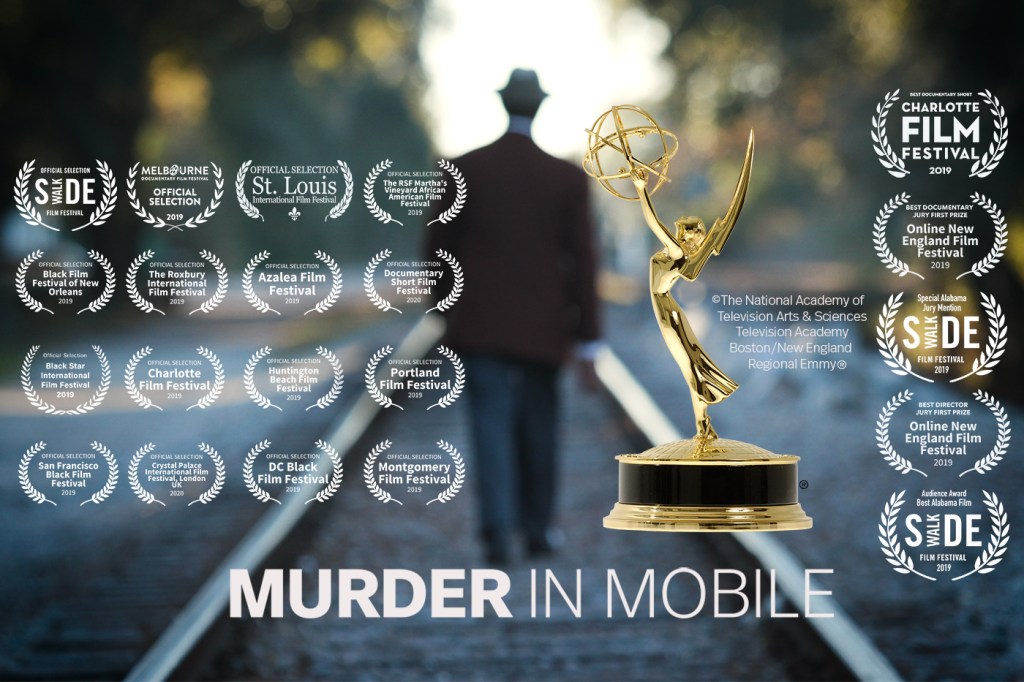“Murder in Mobile” honored with a Regional Emmy Award for best documentary

Murder in Mobile, the timeless story of an unresolved Jim Crow murder in Alabama, has earned a Boston/New England Regional Emmy® Award in the documentary category.
“Our goal was to tell a story that would honor this man who had died needlessly and unjustly,” says Adam Fischer, who directed the 23-minute documentary in collaboration with his partner at Northeastern Films, Benjamin Bertsch. “Sadly, the story of Rayfield Davis is more relevant than ever.”
Murder in Mobile brings to light the 1948 killing of Davis, a 53-year-old Black man beaten to death by Horace Miller, a 20-year-old white man who confessed yet escaped prosecution for his crime. The details had been uncovered by Chelsea Schmitz, a Northeastern law student assigned to the case by the Civil Rights and Restorative Justice Project, a Northeastern initiative founded a decade ago by law professor and civil rights activist Margaret Burnham.
Burnham’s volunteer team of Northeastern law students has discovered and investigated more than 500 acts of racial violence that took place in the South from 1930 to 1970. As many as 1,500 hate crimes that were not prosecuted in the Jim Crow era are waiting to be uncovered by her group, Burnham has said.
“Professor Burnham and her team have been relentless in their pursuit of the truth and they brought closure along with justice to families like that of Mr. Davis,” says Renata Nyul, vice president for communications at Northeastern. “It was an honor for us to tell this important story and we are grateful for Professor Burnham’s dedication.”
Fischer and Bertsch had planned originally to create a sprawling documentary based on Northeastern investigations of six Black men who had been murdered in Mobile during the 1940s by white men who were not held to account for their crimes.
An inspired speech by Burnham, featured in Murder in Mobile, offers historical context to the ongoing Black Lives Matter movement, which shows no signs of abating more than four weeks after the killing of George Floyd by a police officer in Minneapolis.
“These six Mobile cases are about resistance,” Burnham says in the film, at a 2018 ceremony in Mobile that was devoted to the six victims. “We’re here honoring these men not just for what they did and the sacrifice they gave, but for what they represent, and for the thousands in whose names they died.
“That story, we haven’t finished telling it. We’re only scraping the surface of that story. We owe that story to those who come behind us. If we don’t do this work, if we don’t discover the Rayfield Davises of the world, it won’t get discovered.”
In addition to the Regional Emmy®, Murder in Mobile has been screened at 17 film festivals in five countries and has received five awards.
Fischer and Bertsch focused their documentary on Davis, in part because his distant cousin, Nichole Ulmer, had been actively pursuing justice for his forgotten case.
Bertsch noted that an urgent global response to the deaths of Floyd, Ahmaud Arbery, and other Black people has been sparked by videos of the killings.
“Film is an emotional medium,” said Bertsch, who served as director of photography of Murder in Mobile. “If you create emotion in people, then maybe you can create a change in behavior.”
Fischer and Bertsch hired actors to recreate the murder at the crime scene in Mobile, a short walk along the railroad tracks from where Davis lived. They discovered that Miller was still alive, and that his granddaughter had married a Black man and had written a heartfelt letter of condolence to Ulmer that repudiated Miller’s racism.
At the end of the documentary, Ulmer says that her goal would be to speak with Miller in hope that his feelings for Black people have evolved since that early evening 72 years ago when he attacked Rayfield Davis and left him to die on the bank of a shallow creek.
“I would ask him, ‘How is your feelings toward the African American race?’ ” she says. “‘Can I sit down at your dinner table with you and have dinner with you? Would you invite me?’”
She sits in silence, staring into the camera, as if waiting for the answer.
“Every time you see that moment, you just get choked up,” says Fischer.
“Because the viewer knows what Horace Miller’s answer would be,” says Bertsch. “You know he doesn’t want to sit down with her. But the fact that she’s asking…”
For media inquiries, please contact media@northeastern.edu.






